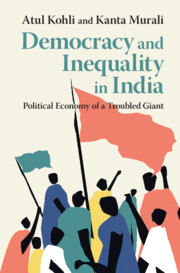Refine search
Actions for selected content:
1363 results
12 - The Imperial Romance
- from Part II - Entanglements of Prose, Poetry, and Empire: 1800–1900
-
-
- Book:
- The Cambridge Companion to British Literature and Empire
- Published online:
- 20 November 2025
- Print publication:
- 04 December 2025, pp 174-186
-
- Chapter
- Export citation
5 - Anglophone Epics and Ruin Poetry in Eighteenth-Century India
- from Part I - Early Intimations and Literary Genres: 1500–1800
-
-
- Book:
- The Cambridge Companion to British Literature and Empire
- Published online:
- 20 November 2025
- Print publication:
- 04 December 2025, pp 77-92
-
- Chapter
- Export citation
Chapter 10 - Twenty Questions about Employment Testing Bias and Unfairness in India
-
-
- Book:
- Global Perspectives on the Definition, Assessment, and Reduction of Bias and Unfairness in Employment Testing
- Published online:
- 04 November 2025
- Print publication:
- 20 November 2025, pp 199-230
-
- Chapter
- Export citation
Male Salesgirls and Carlik Beep: Indian English at the grassroots in India and Oman
-
- Journal:
- English Today , First View
- Published online by Cambridge University Press:
- 19 November 2025, pp. 1-10
-
- Article
-
- You have access
- Open access
- HTML
- Export citation
Local peoples’ values and disvalues in and around an Indian protected area undergoing urbanization
-
- Journal:
- Environmental Conservation , First View
- Published online by Cambridge University Press:
- 10 November 2025, pp. 1-9
-
- Article
-
- You have access
- Open access
- HTML
- Export citation
7 - India and the World
- from Part IV - India and the World
-
- Book:
- Democracy and Inequality in India
- Published online:
- 11 October 2025
- Print publication:
- 30 October 2025, pp 267-295
-
- Chapter
- Export citation
Introduction
-
- Book:
- Democracy and Inequality in India
- Published online:
- 11 October 2025
- Print publication:
- 30 October 2025, pp 1-12
-
- Chapter
- Export citation
2 - ‘The Highe Priest hath banished you forth’: Missionary Protestantism and the Origins of the British Empire
-
- Book:
- The University of Cambridge in the Age of Atlantic Slavery
- Published online:
- 12 September 2025
- Print publication:
- 30 October 2025, pp 49-75
-
- Chapter
-
- You have access
- Open access
- HTML
- Export citation
7 - Domestic Interpretations of the Human Right to Family Planning
-
- Book:
- Population Control as a Human Right
- Published online:
- 09 October 2025
- Print publication:
- 23 October 2025, pp 129-157
-
- Chapter
- Export citation
How Migrating Overseas Shapes Political Preferences: Evidence from a Field Experiment
-
- Journal:
- International Organization , First View
- Published online by Cambridge University Press:
- 16 October 2025, pp. 1-38
-
- Article
- Export citation
Decolonising Rural Spaces: FAO in India and British-Malaya, c. 1947-1965.
-
- Journal:
- Itinerario , First View
- Published online by Cambridge University Press:
- 15 October 2025, pp. 1-21
-
- Article
-
- You have access
- Open access
- HTML
- Export citation
Reimagining stormwater management: sustainable drainage pathways for resilient Indian cities
-
- Journal:
- Environmental Conservation , First View
- Published online by Cambridge University Press:
- 13 October 2025, pp. 1-7
-
- Article
- Export citation
Between Rule and Prerogative: Petitions by Terror-Accused Individuals and the Imaginings of Indian Law
-
- Journal:
- Asian Journal of Law and Society , First View
- Published online by Cambridge University Press:
- 13 October 2025, pp. 1-27
-
- Article
-
- You have access
- Open access
- HTML
- Export citation

Democracy and Inequality in India
- Political Economy of a Troubled Giant
-
- Published online:
- 11 October 2025
- Print publication:
- 30 October 2025
Cooperation and the management of local common resources in remote rural communities
-
- Journal:
- Environment and Development Economics , First View
- Published online by Cambridge University Press:
- 09 October 2025, pp. 1-23
-
- Article
-
- You have access
- Open access
- HTML
- Export citation
Contested Tribes: The Subjectivity of Tribe and State in India
- Part of
-
- Journal:
- Public Humanities / Volume 1 / 2025
- Published online by Cambridge University Press:
- 08 October 2025, e143
-
- Article
-
- You have access
- Open access
- HTML
- Export citation
Chapter 35 - China and India
- from Asia and the Americas
-
-
- Book:
- The Cambridge Guide to Global Medieval Travel Writing
- Published online:
- 03 October 2025
- Print publication:
- 02 October 2025, pp 623-639
-
- Chapter
- Export citation
Worldmaking on shifting ice: Chinese and Indian cultural geographies of Antarctica
-
- Journal:
- Polar Record / Volume 61 / 2025
- Published online by Cambridge University Press:
- 29 September 2025, e24
-
- Article
-
- You have access
- Open access
- HTML
- Export citation
Validation of a screener to assess ultra-processed food consumption in the adult Indian population: the Nova-UPF Screener (for India)
- Part of
-
- Journal:
- British Journal of Nutrition , First View
- Published online by Cambridge University Press:
- 26 September 2025, pp. 1-12
-
- Article
-
- You have access
- Open access
- HTML
- Export citation
10 - A. R. Desai’s Marxist Critique of Nationalism and of the Indian Nation-State
- from Part III - Dissident Sociologists
-
-
- Book:
- Anticolonialism and Social Thought
- Published online:
- 16 September 2025
- Print publication:
- 25 September 2025, pp 234-252
-
- Chapter
- Export citation
